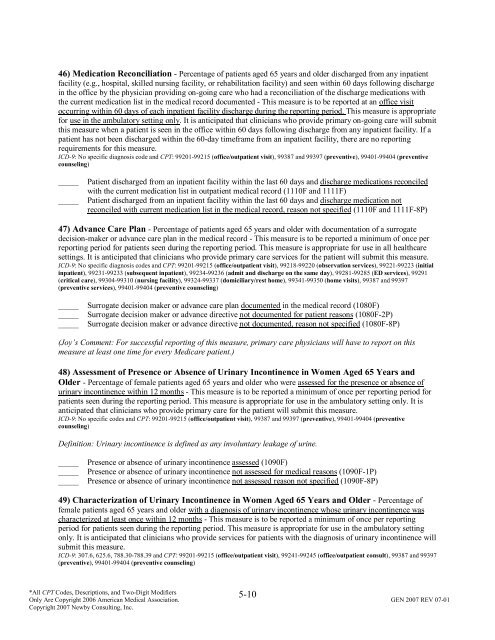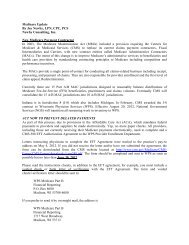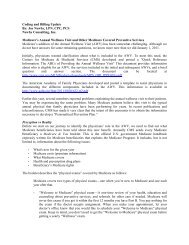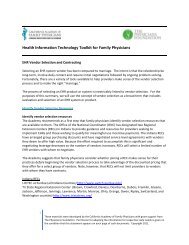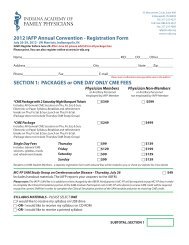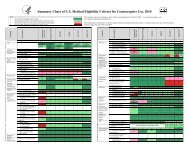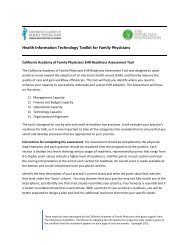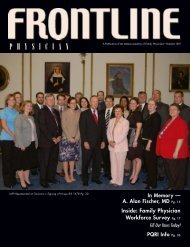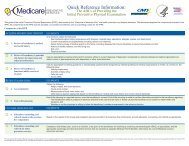pqri measure coding and reporting principles - Indiana Academy of ...
pqri measure coding and reporting principles - Indiana Academy of ...
pqri measure coding and reporting principles - Indiana Academy of ...
Create successful ePaper yourself
Turn your PDF publications into a flip-book with our unique Google optimized e-Paper software.
46) Medication Reconciliation - Percentage <strong>of</strong> patients aged 65 years <strong>and</strong> older discharged from any inpatient<br />
facility (e.g., hospital, skilled nursing facility, or rehabilitation facility) <strong>and</strong> seen within 60 days following discharge<br />
in the <strong>of</strong>fice by the physician providing on-going care who had a reconciliation <strong>of</strong> the discharge medications with<br />
the current medication list in the medical record documented - This <strong>measure</strong> is to be reported at an <strong>of</strong>fice visit<br />
occurring within 60 days <strong>of</strong> each inpatient facility discharge during the <strong>reporting</strong> period. This <strong>measure</strong> is appropriate<br />
for use in the ambulatory setting only. It is anticipated that clinicians who provide primary on-going care will submit<br />
this <strong>measure</strong> when a patient is seen in the <strong>of</strong>fice within 60 days following discharge from any inpatient facility. If a<br />
patient has not been discharged within the 60-day timeframe from an inpatient facility, there are no <strong>reporting</strong><br />
requirements for this <strong>measure</strong>.<br />
ICD-9: No specific diagnosis code <strong>and</strong> CPT: 99201-99215 (<strong>of</strong>fice/outpatient visit), 99387 <strong>and</strong> 99397 (preventive), 99401-99404 (preventive<br />
counseling)<br />
_____<br />
_____<br />
Patient discharged from an inpatient facility within the last 60 days <strong>and</strong> discharge medications reconciled<br />
with the current medication list in outpatient medical record (1110F <strong>and</strong> 1111F)<br />
Patient discharged from an inpatient facility within the last 60 days <strong>and</strong> discharge medication not<br />
reconciled with current medication list in the medical record, reason not specified (1110F <strong>and</strong> 1111F-8P)<br />
47) Advance Care Plan - Percentage <strong>of</strong> patients aged 65 years <strong>and</strong> older with documentation <strong>of</strong> a surrogate<br />
decision-maker or advance care plan in the medical record - This <strong>measure</strong> is to be reported a minimum <strong>of</strong> once per<br />
<strong>reporting</strong> period for patients seen during the <strong>reporting</strong> period. This <strong>measure</strong> is appropriate for use in all healthcare<br />
settings. It is anticipated that clinicians who provide primary care services for the patient will submit this <strong>measure</strong>.<br />
ICD-9: No specific diagnosis codes <strong>and</strong> CPT: 99201-99215 (<strong>of</strong>fice/outpatient visit), 99218-99220 (observation services), 99221-99223 (initial<br />
inpatient), 99231-99233 (subsequent inpatient), 99234-99236 (admit <strong>and</strong> discharge on the same day), 99281-99285 (ED services), 99291<br />
(critical care), 99304-99310 (nursing facility), 99324-99337 (domiciliary/rest home), 99341-99350 (home visits), 99387 <strong>and</strong> 99397<br />
(preventive services), 99401-99404 (preventive counseling)<br />
_____<br />
_____<br />
_____<br />
Surrogate decision maker or advance care plan documented in the medical record (1080F)<br />
Surrogate decision maker or advance directive not documented for patient reasons (1080F-2P)<br />
Surrogate decision maker or advance directive not documented, reason not specified (1080F-8P)<br />
(Joy’s Comment: For successful <strong>reporting</strong> <strong>of</strong> this <strong>measure</strong>, primary care physicians will have to report on this<br />
<strong>measure</strong> at least one time for every Medicare patient.)<br />
48) Assessment <strong>of</strong> Presence or Absence <strong>of</strong> Urinary Incontinence in Women Aged 65 Years <strong>and</strong><br />
Older - Percentage <strong>of</strong> female patients aged 65 years <strong>and</strong> older who were assessed for the presence or absence <strong>of</strong><br />
urinary incontinence within 12 months - This <strong>measure</strong> is to be reported a minimum <strong>of</strong> once per <strong>reporting</strong> period for<br />
patients seen during the <strong>reporting</strong> period. This <strong>measure</strong> is appropriate for use in the ambulatory setting only. It is<br />
anticipated that clinicians who provide primary care for the patient will submit this <strong>measure</strong>.<br />
ICD-9: No specific codes <strong>and</strong> CPT: 99201-99215 (<strong>of</strong>fice/outpatient visit), 99387 <strong>and</strong> 99397 (preventive), 99401-99404 (preventive<br />
counseling)<br />
Definition: Urinary incontinence is defined as any involuntary leakage <strong>of</strong> urine.<br />
_____<br />
_____<br />
_____<br />
Presence or absence <strong>of</strong> urinary incontinence assessed (1090F)<br />
Presence or absence <strong>of</strong> urinary incontinence not assessed for medical reasons (1090F-1P)<br />
Presence or absence <strong>of</strong> urinary incontinence not assessed reason not specified (1090F-8P)<br />
49) Characterization <strong>of</strong> Urinary Incontinence in Women Aged 65 Years <strong>and</strong> Older - Percentage <strong>of</strong><br />
female patients aged 65 years <strong>and</strong> older with a diagnosis <strong>of</strong> urinary incontinence whose urinary incontinence was<br />
characterized at least once within 12 months - This <strong>measure</strong> is to be reported a minimum <strong>of</strong> once per <strong>reporting</strong><br />
period for patients seen during the <strong>reporting</strong> period. This <strong>measure</strong> is appropriate for use in the ambulatory setting<br />
only. It is anticipated that clinicians who provide services for patients with the diagnosis <strong>of</strong> urinary incontinence will<br />
submit this <strong>measure</strong>.<br />
ICD-9: 307.6, 625.6, 788.30-788.39 <strong>and</strong> CPT: 99201-99215 (<strong>of</strong>fice/outpatient visit), 99241-99245 (<strong>of</strong>fice/outpatient consult), 99387 <strong>and</strong> 99397<br />
(preventive), 99401-99404 (preventive counseling)<br />
5-10<br />
*All CPT Codes, Descriptions, <strong>and</strong> Two-Digit Modifiers<br />
Only Are Copyright 2006 American Medical Association. GEN 2007 REV 07-01<br />
Copyright 2007 Newby Consulting, Inc.


